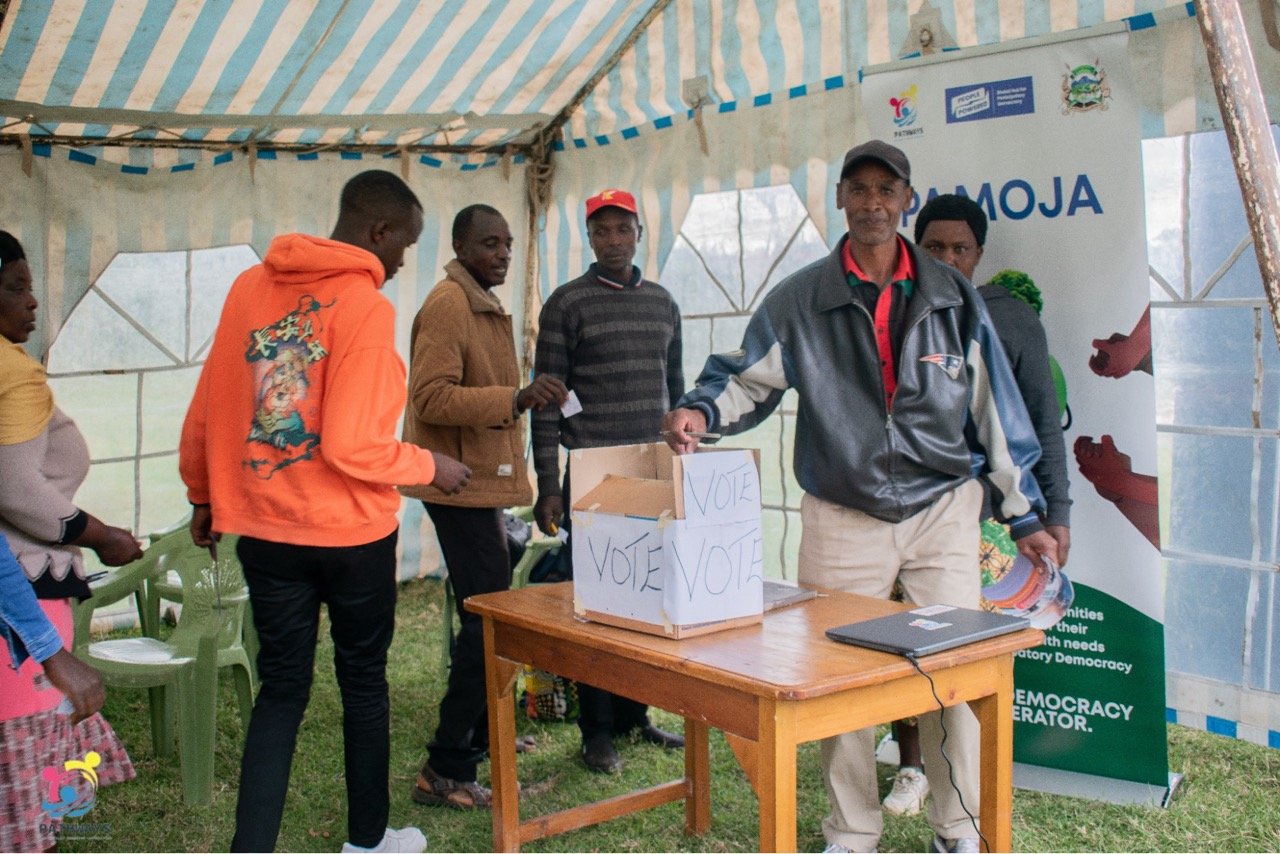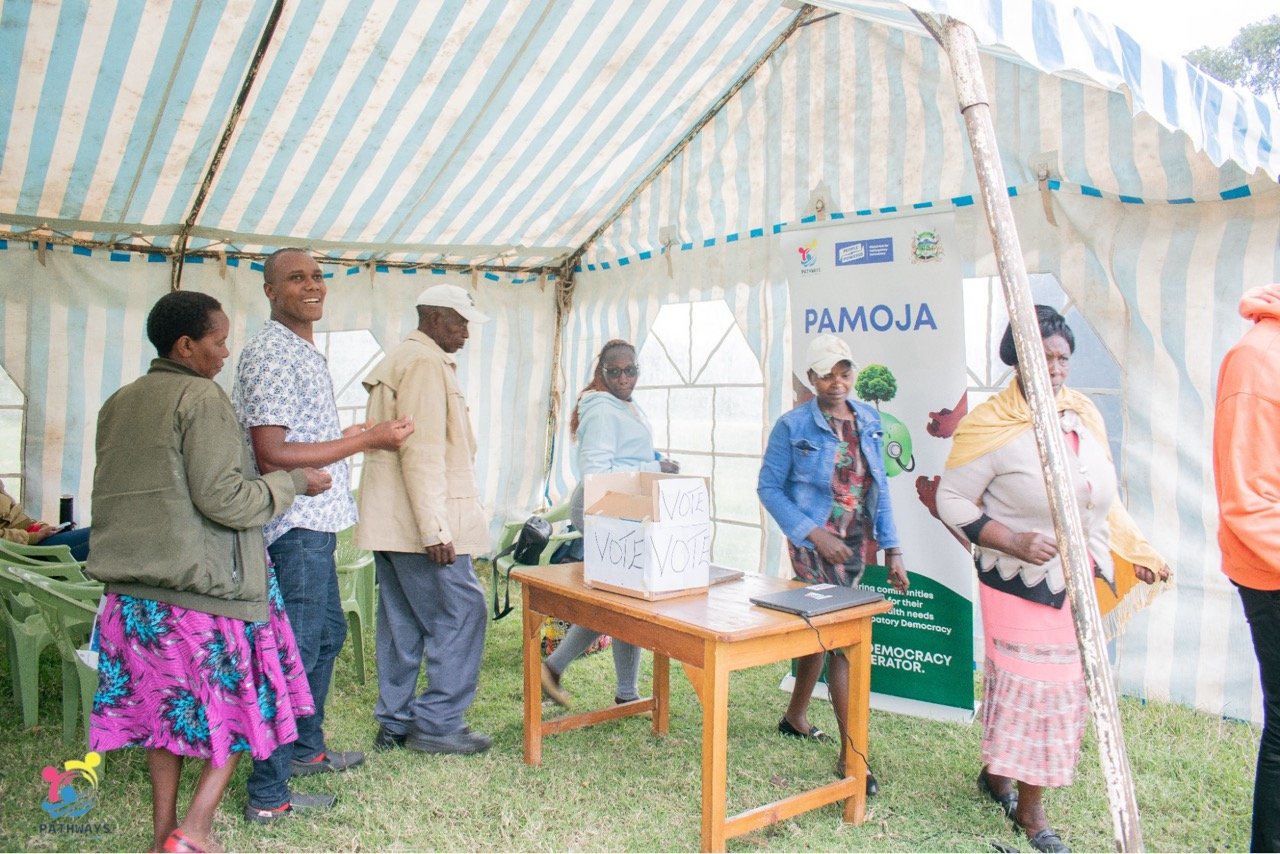Participatory methods build trust & deliver clean water in Kenya
/After more than 12 years of unfulfilled promises from the county government to build a water system, participatory methods helped a community of 44,000 people in Kenya gain access to clean water and begin building back trust. In this post, we share the inspiring success story of the Pathways Policy Institute (PPI), a People Powered member and one of the first beneficiaries of our Rising Stars Mentorship Program.
Over a Decade of Delayed Progress
The Kiandege water project in Laikipia County promised to build a network of pipes connecting a source of clean water in the mountains of the Aberdare forest to the farms, communities, and households in the foothills and lowlands ultimately serving 44,000 people, including a camp for 12,000 internally displaced people. Yet, after more than 12 years, the project had seemingly stalled in the planning stages, and most community members were still waiting for the promise of running water to be fulfilled.
As Peter Ngure explains, “Many government officials and donors had come in, supported one section or another, and left. This made the community leaders and members feel disenfranchised and lose hope of ever having the project completed and the community access to water.” The long delays, frustrating starts and stops, and seemingly empty promises from government officials during elections to complete the project led to a breakdown in trust among community members and government.
An Opportunity for Participatory Engagement
However, the Pathways Policy Institute (PPI), a community-based policy and accountability NGO focused on improving public health and achieving climate justice in Kenya through research, training, and capacity building, saw an opportunity to meaningfully engage the community and co-develop a solution.
As Vice Chairperson of PPI, Peter Ngure also recognized that addressing this problem would require “support from a seasoned institution that not only offered advice one-off, [but] would walk with us throughout the identification of needs of the community, development of concrete ways forward.”
The Mentorship Match
Through the Rising Stars Mentorship Program, People Powered facilitated a mentorship between Peter Ngure and Eliza Meriabe. As co-founder of the Nalotuesha Indigenous Women Organization, a platform that champions the inclusion of Indigenous women in governance, Eliza is a seasoned community development leader with detailed knowledge of the local context and the inner workings of the Kenyan government.
Eliza’s familiarity with the Kenyan context was an important asset in the mentoring relationship. She was able to provide insights into the Kenyan government’s budgeting process and timeline to help PPI identify when they could most successfully advocate for funding allocations, which officials to engage that would have the most influence over the water project, and how to create buy-in from the local government.
Peter notes that a key moment in his Rising Stars Mentorship experience was when Eliza encouraged him to reframe the water project as a public health issue. When trying to secure government buy-in on the participatory approach to the water project, the PPI team argued that completing the water infrastructure project was a matter of public health, and would reduce costly treatment of water-borne illnesses and dehydration.
Participatory Solutions Deliver Results
With Eliza’s guidance and encouragement, Peter and the PPI team decided to apply participatory methods to begin rebuilding trust between the community and government, increase accountability, and facilitate the project’s completion. To achieve this incredible feat, PPI organized a clever two-phased participatory approach.
First, they convened meetings open to all members of local communities, where 300-400 community members could collectively discuss and identify their priorities for the water system infrastructure project. The whole community would then elect representatives from their numbers, known as social auditors, to interface directly with government officials and to communicate the priorities they had identified.
In the second phase, both the elected social auditors and government officials would hold a meeting with the community to present what they proposed as a path forward, answer questions, and ultimately be held to account. Thanks to this innovative participatory mechanism, community members began to feel that their voices were accurately represented and effectively communicated to the county government.
The community forums also provided an opportunity for government officials to better understand the challenges and frustrations of their constituents, while community leaders were able to more fully appreciate the budgetary constraints and competing priorities of government officials.
This type of constructive, two-way dialogue with the local government was previously unimaginable to many community members who, Peter says, tended to lack awareness of the power of their voices and felt they had little influence over government decisions. Now, he says, community members make a point of attending assemblies for debate and have even self-organized to submit memos to the government making project proposals to help improve their communities.
Peter acknowledged that building back trust will take time, but already there has been considerable progress. Government officials once avoided interfacing with the community for fear of criticism, but now they routinely interact with the community. Even the Governor recently attended a community forum facilitated by PPI. The government has formally allocated funding in this year’s budget to the project and has begun delivering the piping and other materials necessary to expand the water system to more households.
Making Participatory Democracy the Default
After demonstrating the success of these participatory methods, Peter and the PPI team are now trying to mainstream this participatory approach, so that community forums and elected social auditors become standard practice. Over time, this will strengthen relationships between the government and communities, build back the trust that has been lost, and will continue empowering community members to have more say in government affairs.
PPI is also leveraging the success of the Kiandege water project to encourage the Laikipia County government to invest more broadly in water and health infrastructure.
County officials have now begun to view the provision of water as a means of improving public health outcomes. There are now several projects underway to drill wells at community health centers, suggesting a genuine shift in the mindset of local government officials around the link between clean water and public health.
In addition, one of PPI’s team members, Sherry Muthaura, has now become a Rising Stars Mentor to share the insights and lessons learned by PPI through the process of implementing this incredible participatory process. We at People Powered are proud to count PPI as one of our members and look forward to continuing to walk with them in their work and learning from their successes.
Are you looking for expert support to help you advocate, launch, or improve a participatory program? The Rising Stars Mentorship Program might be the right fit. Visit the People Powered website for more information, or apply for your Rising Stars Mentor by February 26 to join the next cycle. Feeling inspired? You can donate to support the work of People Powered so we can continue providing free mentorship services to organizations like the Pathways Policy Institute and continue building more participatory and just democracies together.








